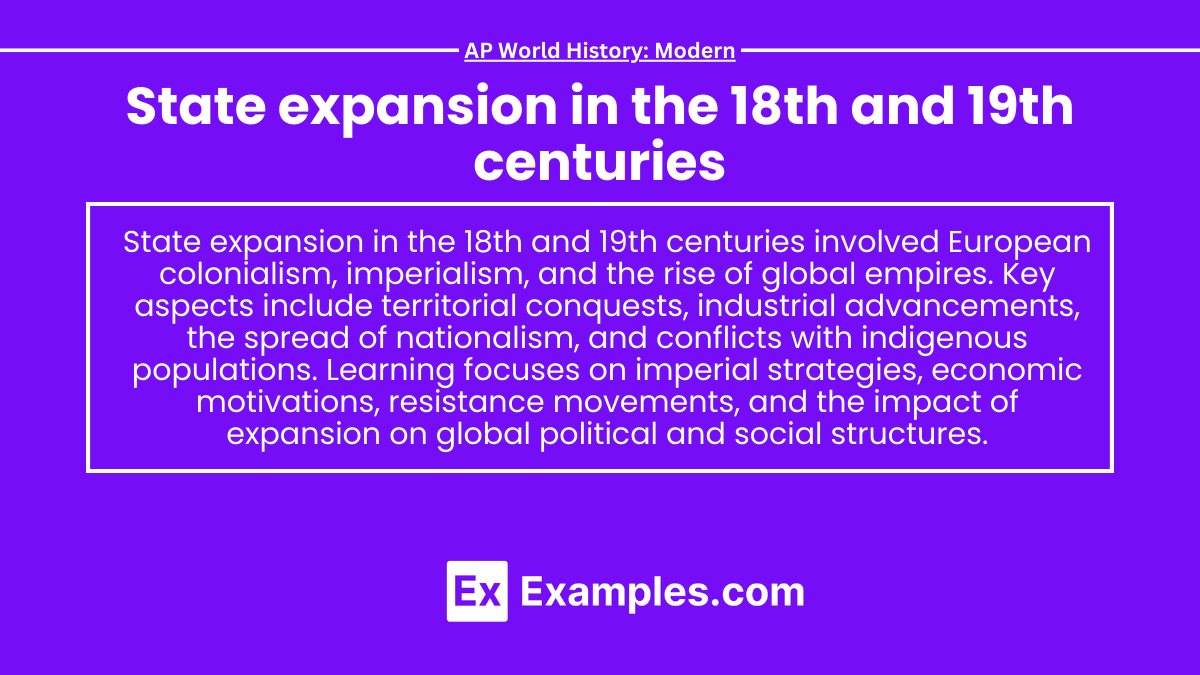State expansion in the 18th and 19th centuries was marked by the aggressive growth of empires, driven by economic, political, and cultural motives. European powers, the United States, and Russia expanded their territories through colonization, military conquest, and diplomacy, reshaping global dynamics. This era of imperialism significantly impacted Africa, Asia, and the Americas, altering societies worldwide.
Learning Objective
In studying “State Expansion in the 18th and 19th Centuries” for AP World History: Modern, you should learn to identify the political, economic, and technological factors that drove imperial expansion, analyze the role of nationalism and industrialization in fueling territorial ambitions, and evaluate the impacts of state expansion on colonized regions, including resistance movements, cultural changes, and shifts in global power dynamics. Additionally, you should examine how these expansions reshaped borders and influenced diplomatic relations in the modern era.
1. The Rise of European Empires
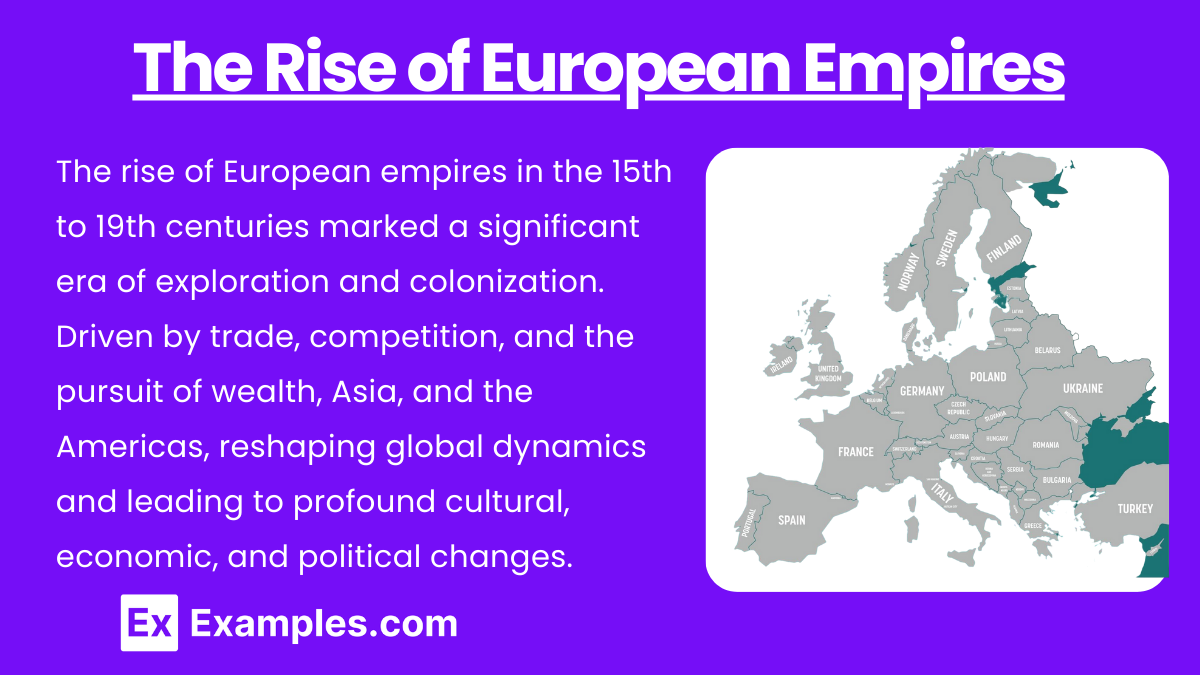
The rise of European empires in the 15th to 19th centuries marked a significant era of exploration and colonization. Driven by trade, competition, and the pursuit of wealth, European powers expanded their territories across Africa, Asia, and the Americas, reshaping global dynamics and leading to profound cultural, economic, and political changes.
- Imperial Expansion: During the 18th and 19th centuries, European powers such as Britain, France, Spain, Portugal, the Netherlands, and later Germany and Belgium expanded their empires significantly.
- Motives for Expansion: The key motives included the desire for raw materials, new markets, the spread of Christianity, and national prestige. Economic interests fueled by the Industrial Revolution played a significant role.
- Colonial Rivalries: European countries competed fiercely, leading to intense rivalries and conflicts, such as the Seven Years’ War (1756–1763), which had a global impact.
2. The Scramble for Africa
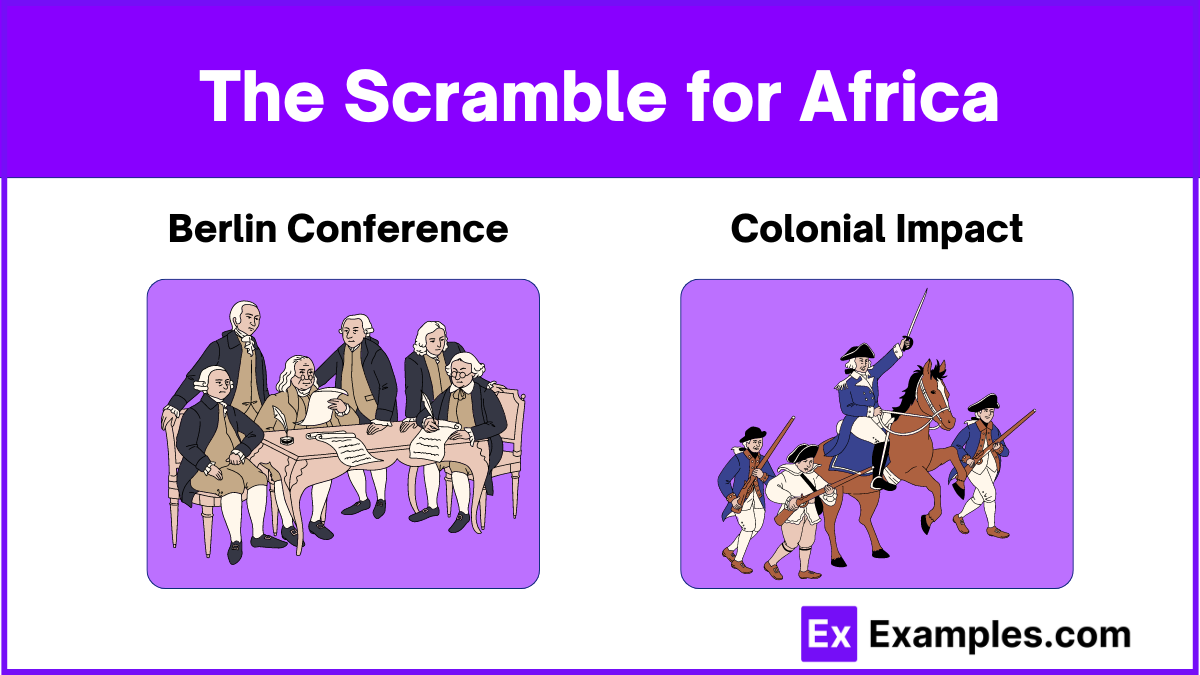
- Berlin Conference (1884-1885): European powers convened to divide Africa without African input, marking the formal beginning of the “Scramble for Africa.” This led to rapid colonization by the end of the 19th century. The Berlin Conference of 1884-1885 was a pivotal meeting where European powers convened to regulate colonial claims in Africa. Led by Otto von Bismarck, the conference aimed to prevent conflict over territorial disputes. It resulted in the partitioning of Africa, often disregarding indigenous cultures and leading to long-lasting repercussions for the continent.
- Colonial Impact: The new colonial borders often disregarded existing ethnic, cultural, and political boundaries, leading to long-term political and social issues in Africa. Colonial impact significantly altered the social, economic, and political landscapes of colonized nations. European powers exploited resources, imposed foreign governance, and disrupted traditional cultures, leading to profound changes. This legacy includes economic dependency, cultural assimilation, and ongoing struggles for independence, with lasting effects that continue to influence former colonies today.
3. Ottoman Empire’s Contraction and Challenges
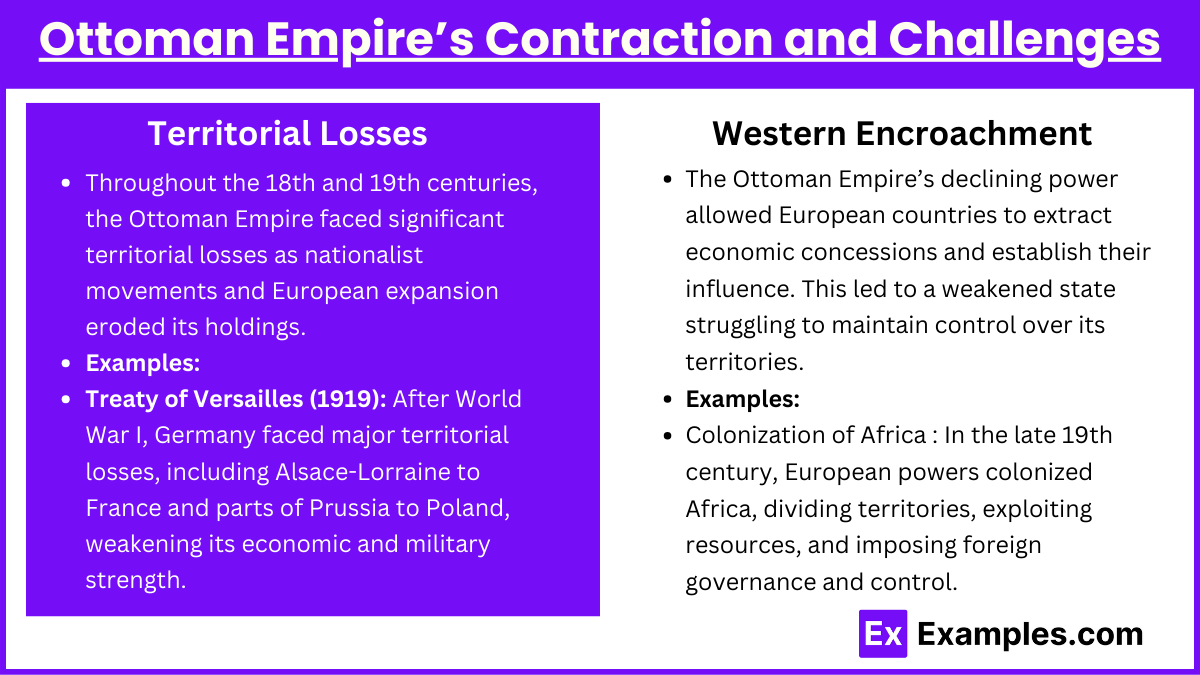
Territorial Losses:
- Throughout the 18th and 19th centuries, the Ottoman Empire faced significant territorial losses as nationalist movements and European expansion eroded its holdings. Key regions like Greece, Egypt, Algeria, and the Balkans gained independence or were absorbed by European powers.
- Example of Territorial Losses:
- Treaty of Versailles (1919): After World War I, Germany faced major territorial losses, including Alsace-Lorraine to France and parts of Prussia to Poland, weakening its economic and military strength.
Western Encroachment:
- The Ottoman Empire’s declining power allowed European countries to extract economic concessions and establish their influence. This led to a weakened state struggling to maintain control over its territories.
- Example of Western Encroachment:
- Colonization of Africa (Scramble for Africa):In the late 19th century, European powers colonized Africa, dividing territories, exploiting resources, and imposing foreign governance and control.
4. The Expansion of the United States and Russia
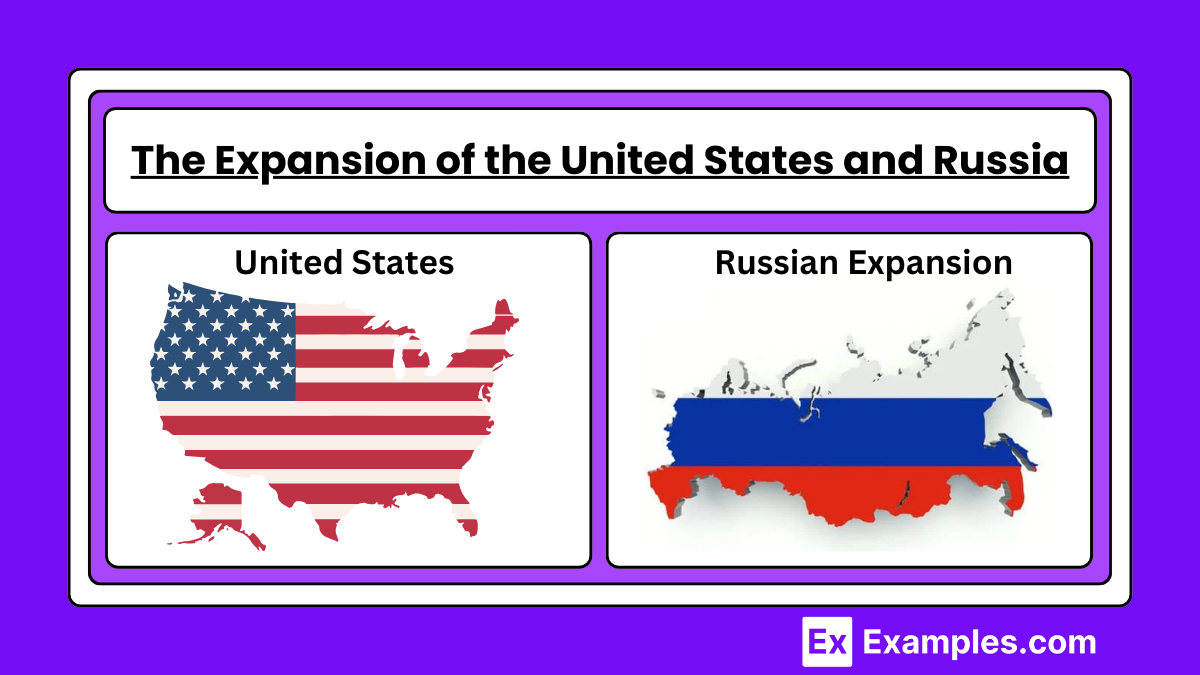
- United States:
- The concept of Manifest Destiny drove American territorial expansion across North America. The United States acquired territories through purchases, treaties, and wars, such as the Louisiana Purchase (1803) and the Mexican-American War (1846–1848), which led to the acquisition of present-day California, Nevada, Utah, and Arizona.
- The rapid westward expansion often resulted in the displacement and violent suppression of Native American tribes, leading to numerous conflicts.
- Russian Expansion:
- Russia expanded eastward across Siberia, reaching the Pacific coast by the 17th century. By the 19th century, it had expanded into Central Asia, the Caucasus, and Alaska, forming a vast empire.
- The Russian Empire was marked by a multi-ethnic population, and its expansion brought diverse cultures and religions under Russian rule, which sometimes led to tensions and resistance.
5. Technological and Military Factors
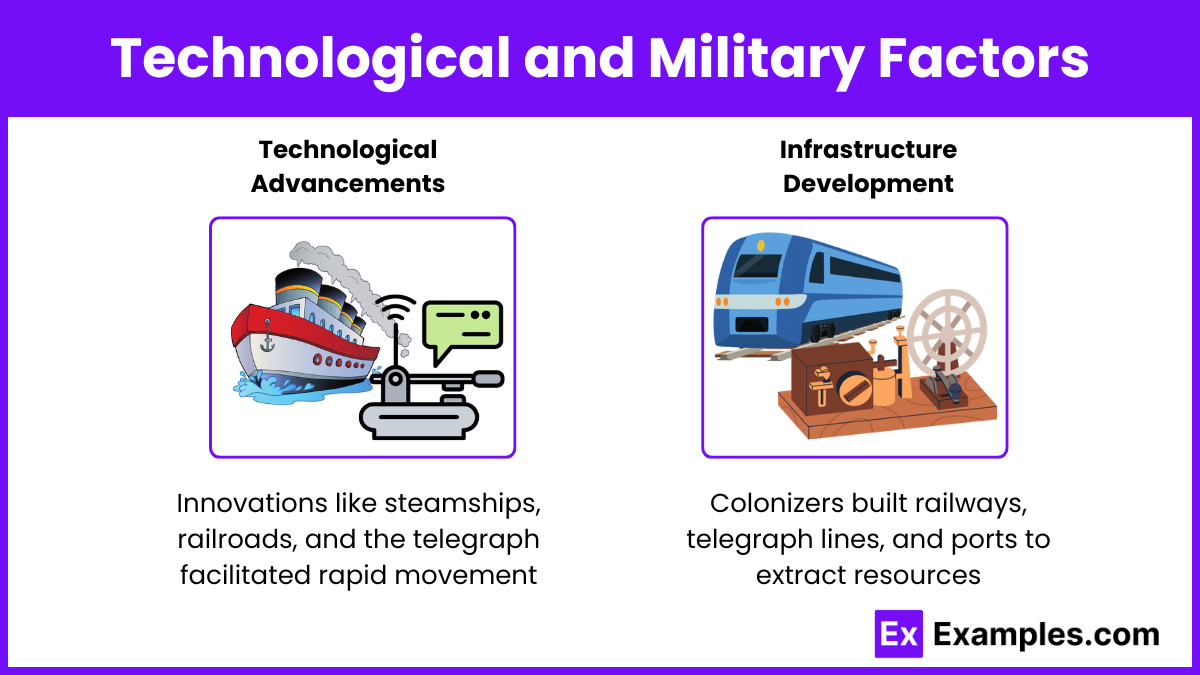
- Technological Advancements:
- Innovations like steamships, railroads, and the telegraph facilitated rapid movement and communication, allowing imperial powers to maintain control over distant colonies more effectively.
- The invention of the Maxim gun (the first automatic machine gun) and improved rifles provided European armies with a significant military advantage over indigenous forces, leading to swift victories in many conflicts.
- Infrastructure Development:
- Colonizers often built infrastructure like railways, telegraph lines, and ports to facilitate the extraction of resources and the movement of troops. However, these developments were primarily intended to serve colonial interests rather than improve the lives of the local population.
Examples
Example 1: British Expansion in India
The British East India Company expanded control, establishing the British Raj in 1858. India became vital for raw materials and markets.
Example 2: The Scramble for Africa
European powers rapidly colonized Africa, dividing territories after the Berlin Conference (1884-1885). Colonization exploited Africa’s resources, altering its political landscape.
Example 3: Russian Expansion into Siberia and Central Asia
Russia expanded eastward, reaching the Pacific, then into Central Asia, securing resources, trade routes, and strategic military advantages.
Example 4: The United States’ Westward Expansion
Driven by Manifest Destiny, the U.S. expanded west, acquiring lands through treaties, purchases, and wars, displacing Native American tribes.
Example 5: French Expansion in Southeast Asia
France colonized Vietnam, Laos, and Cambodia, forming French Indochina by the late 19th century, exploiting resources like rubber and rice.
MCQs
Question 1:
Which European power was the primary colonizer of India in the 18th and 19th centuries?
A) France
B) Portugal
C) Britain
D) Netherlands
Answer: C) Britain
Explanation:
Britain expanded its control over India via the British East India Company, establishing the British Raj in 1858 after the Indian Rebellion of 1857.
Question 2:
The Berlin Conference (1884-1885) was significant because it:
A) Ended the Napoleonic Wars
B) Divided Africa among European powers
C) Established British rule in India
D) Led to American westward expansion
Answer: B) Divided Africa among European powers
Explanation:
The Berlin Conference allowed European countries to formally divide Africa, leading to the “Scramble for Africa” and altering African political boundaries.
Question 3:
Which ideology justified the United States’ territorial expansion in the 19th century?
A) Social Darwinism
B) Manifest Destiny
C) The White Man’s Burden
D) Imperialism
Answer: B) Manifest Destiny
Explanation:
Manifest Destiny was the belief that the U.S. was destined to expand westward, driving territorial acquisition and the displacement of Native American tribes.

